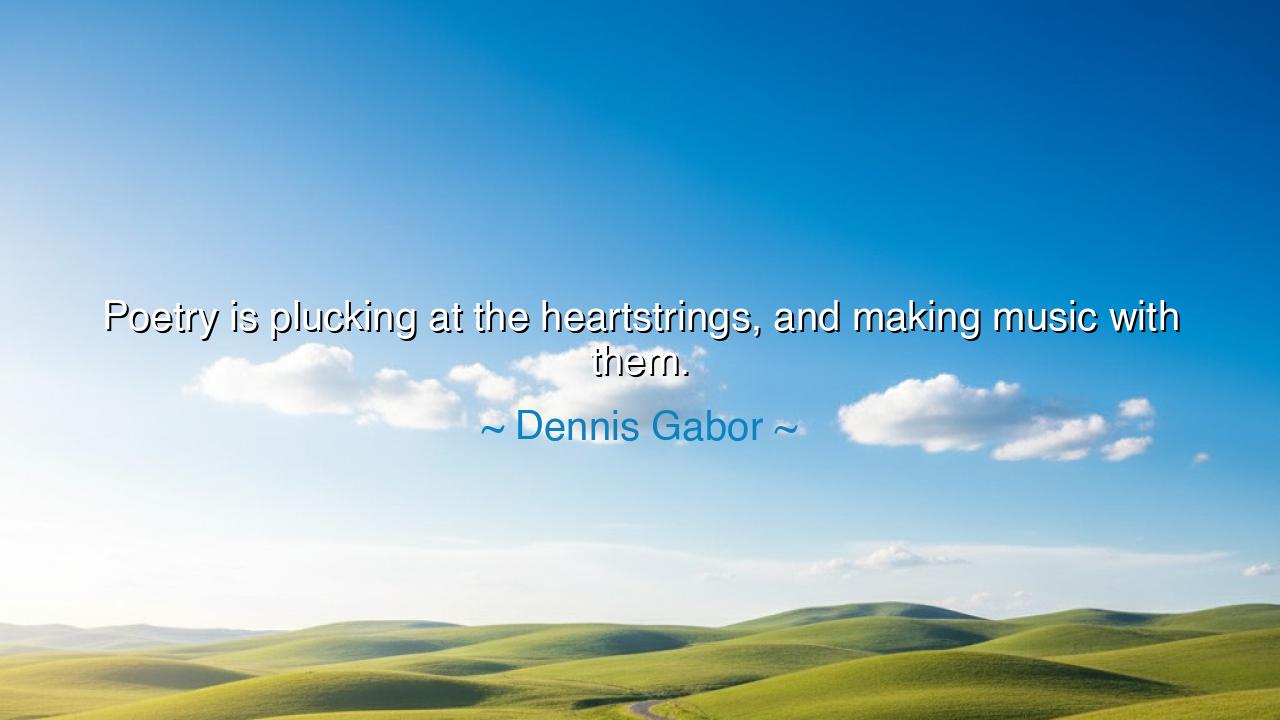
Poetry is plucking at the heartstrings, and making music with






The Nobel laureate and visionary Dennis Gabor, though known to the world for his scientific genius, once spoke with the soul of a poet when he declared: “Poetry is plucking at the heartstrings, and making music with them.” These words remind us that poetry is not simply arrangement of words, but the stirring of emotions, the awakening of hidden truths, and the crafting of melodies not with instruments, but with the human spirit itself.
To speak of plucking at the heartstrings is to speak of vulnerability. The heart is not a fortress of stone but a harp, delicate and resonant. When touched by poetry, it vibrates with joy, sorrow, longing, or hope. A true poet does not simply write; he reaches into the depths of another’s soul and causes it to sing. Just as the musician’s fingers can draw sound from silent strings, so the poet’s words can draw tears from the eyes, or courage from the weary heart.
But Gabor goes further, saying that poetry is making music with them. Here lies the divine secret: poetry does not simply stir emotions—it orders them, shapes them, transforms them into harmony. For music is not noise but structure, not chaos but rhythm. Poetry takes the wild tangle of human feeling and weaves it into form, so that grief becomes elegy, love becomes sonnet, triumph becomes ode. In this way, poetry turns raw existence into art, giving meaning where before there was only silence or confusion.
History gives us luminous examples. When Homer sang of the fall of Troy, he was not merely recounting battles; he was plucking the heartstrings of an entire people, giving them a song that carried their identity across centuries. His words made music of courage, honor, and loss, and that music still echoes today. Centuries later, when Maya Angelou wrote, “Still I Rise,” she was not only speaking for herself but for generations oppressed. Her poetry stirred hearts like a harp touched by fire, and the music it made was one of defiance and hope.
The beauty of Gabor’s words also lies in the reminder that poetry is universal. One need not be trained in meter or rhyme to create it, for anyone who speaks from the soul plucks at another’s strings. A mother whispering lullabies, a lover writing a letter, a mourner voicing sorrow—all of these are acts of poetry. What matters is not form alone, but sincerity: the courage to speak one’s truth in a way that resonates with others.
The lesson is clear: we must not treat poetry as a luxury or ornament, but as a necessity. For in every age, in every struggle, people have turned to poetry as both shield and sword. It comforts the broken, inspires the dreamer, and binds communities together with shared song. To engage with poetry is to keep one’s heart alive, sensitive to beauty, attuned to truth. Without it, life becomes flat, mechanical—lacking the music that gives existence meaning.
Practically, this means: read poetry often, not with the mind alone but with the heart open. Write your own, even if only a line or two, for in expressing your emotions you transform them into strength. Share poetry with others, for in sharing you pluck not only your own strings but theirs, creating harmony between souls. Let poetry be your companion in joy and in grief, for it will give your feelings a melody that outlives the moment.
So remember Gabor’s wisdom: poetry is not words alone, but the music of the heart. To live poetically is to let your emotions become art, to touch others with your truth, and to join in the eternal symphony of humanity. Pluck the strings of your soul, and let them ring—not in silence, but in music that uplifts, endures, and carries forward the story of us all.






AAdministratorAdministrator
Welcome, honored guests. Please leave a comment, we will respond soon